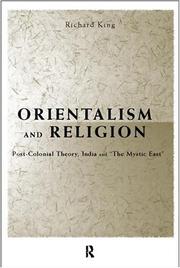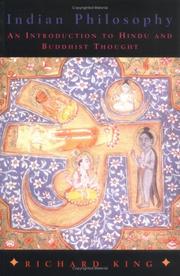| Listing 1 - 10 of 117 | << page >> |
Sort by
|

ISBN: 0415202582 0415202574 9780415202572 9780415202589 Year: 1999 Publisher: London : Routledge,
Abstract | Keywords | Export | Availability | Bookmark
 Loading...
Loading...Choose an application
- Reference Manager
- EndNote
- RefWorks (Direct export to RefWorks)
Orientalism and Religion offers us a timely discussion of the implications of contemporary post-colonial theory for the study of religion. Richard King examines the way in which notions such as mysticism, religion, Hinduism and Buddhism are taken for granted. He shows us how religion needs to be reinterpreted along the lines of cultural studies. Drawing on a variety of post-structuralist and post-colonial thinkers, such as Foucault, Gadamer, Said, and Spivak, King provides us with a challenging series of reflections on the nature of Religious Studies and Indology.
Philosophy, Indic --- Religions --- 294.3 --- 294.3 Boeddhisme--(algemeen) --- 294.3 Boeddhisme:--verder in te delen zoals 291.1/.8 --- Boeddhisme--(algemeen) --- Boeddhisme:--verder in te delen zoals 291.1/.8 --- Indic philosophy --- Philosophy, East Indian --- Hindu philosophy --- Study and teaching --- India --- Indland --- Ḣindiston Respublikasi --- Republic of India --- Bhārata --- Indii︠a︡ --- Inde --- Indië --- Indien --- Sāthāranarat ʻIndīa --- Yin-tu --- Bharat --- Government of India --- インド --- Indo --- Religion --- Study and teaching. --- هند --- Индия --- Orientalism --- religion --- postcolonial theory --- mysticism --- Hinduism --- Biuddhism --- Indology
Book
ISBN: 9780231145435 0231145438 9780231145428 023114542X 9780231518246 0231518242 Year: 2017 Publisher: New York
Abstract | Keywords | Export | Availability | Bookmark
 Loading...
Loading...Choose an application
- Reference Manager
- EndNote
- RefWorks (Direct export to RefWorks)
Religion, Theory, Critique is an essential tool for learning about theory and method in the study of religion. Leading experts engage with contemporary and classical theories as well as non-Western cultural contexts. It is the first textbook which seeks to engage discussion of classical approaches with contemporary cultural and critical theories.--
Religion. --- 291 --- 291 Godsdienstwetenschap: vergelijkend --- 291 Science et histoire comparée des religions --- Godsdienstwetenschap: vergelijkend --- Science et histoire comparée des religions --- Religion, Primitive --- Atheism --- God --- Irreligion --- Religions --- Theology --- Religion --- Philosophy and religion --- Study and teaching. --- Methodology. --- History.
Book
ISBN: 1107294525 1108071643 Year: 1855 Publisher: Place of publication not identified : Cambridge : publisher not identified, Cambridge University Press
Abstract | Keywords | Export | Availability | Bookmark
 Loading...
Loading...Choose an application
- Reference Manager
- EndNote
- RefWorks (Direct export to RefWorks)
Having participated in a rescue mission to aid John Ross in the Arctic in the 1830s, traveller and surgeon Richard King (1810/11-76) considered himself qualified to suggest where the missing expedition of Sir John Franklin, which had set off in 1845, could be found. In his letters to periodicals, government ministers and the Admiralty, published in this collection in 1855, King argues that the missing party would be located near the mouth of the Great Fish River. He volunteered to lead a search expedition, but was ignored. By 1859, remains of the Franklin party had been discovered near to where King said they would be. These letters tell the story of his campaign, throwing light on an interesting chapter in the history of polar exploration and the understanding of the Canadian Arctic. Several other works on Franklin's last expedition and the subsequent searches are also reissued in this series.
Arctic regions --- Northwest Passage. --- Discovery and exploration --- British.
Book
ISBN: 9780774823722 9780774823746 0774823747 9780774823753 0774823755 0774823720 1283864770 Year: 2013 Publisher: Vancouver ; Toronto : UBC Press,
Abstract | Keywords | Export | Availability | Bookmark
 Loading...
Loading...Choose an application
- Reference Manager
- EndNote
- RefWorks (Direct export to RefWorks)
In Milestones on a Golden Road, Richard King presents pivotal works of fiction produced in four key periods of Chinese revolutionary history: the civil war (1945-49), the Great Leap Forward (1958-60), the Cultural Revolution (1966-76), and the post-Mao catharsis (1979-80). Taking its cues from the Soviet Union's optimistic depictions of a society liberated by Communism, the official Chinese literature of this era is characterized by grand narratives of progress. Addressing questions of literary production, King looks at how writers dealt with shifting ideological demands, what indigenous and imported traditions inspired them, and how they were able to depict a utopian Communist future to their readers, even as the present took a very different turn. Early "red classics" were followed by works featuring increasingly lurid images of joyful socialism, and later by fiction exposing the Mao era as an age of irrationality, arbitrary rule, and suffering � a Golden Road that had led to nowhere.
Chinese literature --- Socialism in literature. --- Littérature chinoise --- Socialisme dans la littérature --- History and criticism. --- Histoire et critique --- China --- Chine dans la littérature --- In literature.

ISBN: 0203006089 1134632355 0203158547 1280334975 9780203158548 9780203006085 9781134632350 9786610334971 6610334978 0415202574 9780415202572 0415202582 9780415202589 019565305X 9780195653052 9781280334979 9781134632305 9781134632343 1134632347 Year: 1999 Publisher: London New York
Abstract | Keywords | Export | Availability | Bookmark
 Loading...
Loading...Choose an application
- Reference Manager
- EndNote
- RefWorks (Direct export to RefWorks)
Orientalism and Religion offers us a timely discussion of the implications of contemporary post-colonial theory for the study of religion. Richard King examines the way in which notions such as mysticism, religion, Hinduism and Buddhism are taken for granted. He shows us how religion needs to be reinterpreted along the lines of cultural studies. Drawing on a variety of post-structuralist and post-colonial thinkers, such as Foucault, Gadamer, Said, and Spivak, King provides us with a challenging series of reflections on the nature of Religious Studies and Indology.
Religions --- Philosophy, Indic --- Indic philosophy --- Philosophy, East Indian --- Hindu philosophy --- Study and teaching. --- India --- Bharat --- Bhārata --- Government of India --- Ḣindiston Respublikasi --- Inde --- Indië --- Indien --- Indii︠a︡ --- Indland --- Indo --- Republic of India --- Sāthāranarat ʻIndīa --- Yin-tu --- インド --- هند --- Индия --- Religion --- Religions - Study and teaching. --- Philosophy, Indic - Study and teaching. --- India - Religion - Study and teaching.

ISBN: 1474469892 0585159149 9780585159140 9781474469890 0748609547 9780748609543 0748611606 9780748611607 Year: 2022 Publisher: Edinburgh
Abstract | Keywords | Export | Availability | Bookmark
 Loading...
Loading...Choose an application
- Reference Manager
- EndNote
- RefWorks (Direct export to RefWorks)
What is Indian Philosophy? Why has India been excluded from the history of philosophy? Richard King provides an introduction to the main schools of Hindu and Buddhist thought, emphasising the living history of interaction and debate between the various traditions. The book outlines the broad spectrum of Indian philosophical schools and questions prevailing assumptions about the 'mythical' ahistorical and 'theological' nature of Indian thought. Central philosophical questions are addressed: what really exists? How do we know what we know? Can we trust our perceptions of reality? What are we and where do we come from? Early chapters discuss the nature of philosophy in general, examning the shifting usage of the term throughout history. The author argues that a single definition or characterisation of the subject matter is impossible and that histories of philosophy remain tied to an ethnocentric and colonial perspective so long as they ignore the possibility of philosophical thought 'East of the Suez'. This highlights the need for a post-colonial and global approach to philosophy.Key FeaturesThematic approach rather than separate chapters on various schoolsEmphasis on history of interaction/debate between the various trendsIntroductory and concluding chapters on exclusion of 'India' from history of philosophy
Philosophy, Indic. --- Indic philosophy --- Philosophy, East Indian --- Hindu philosophy --- Philosophy, Indic
Book
Year: 2008 Publisher: Project Gutenberg
Abstract | Keywords | Export | Availability | Bookmark
 Loading...
Loading...Choose an application
- Reference Manager
- EndNote
- RefWorks (Direct export to RefWorks)
Book
ISBN: 9780571243907 Year: 2012 Publisher: London Faber and Faber
Abstract | Keywords | Export | Availability | Bookmark
 Loading...
Loading...Choose an application
- Reference Manager
- EndNote
- RefWorks (Direct export to RefWorks)
Alternative rock music --- Music trade --- History and criticism --- History
Book
Publisher: London Hodder and Stoughton
Abstract | Keywords | Export | Availability | Bookmark
 Loading...
Loading...Choose an application
- Reference Manager
- EndNote
- RefWorks (Direct export to RefWorks)
Book
Year: 1922 Publisher: London Lane
Abstract | Keywords | Export | Availability | Bookmark
 Loading...
Loading...Choose an application
- Reference Manager
- EndNote
- RefWorks (Direct export to RefWorks)
| Listing 1 - 10 of 117 | << page >> |
Sort by
|

 Search
Search Feedback
Feedback About UniCat
About UniCat  Help
Help News
News